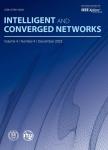Performance analysis of reconfigurable intelligent surface assisted systems under channel aging
作者机构:School of Electronic and Information EngineeringBeijing Jiaotong UniversityBeijing 100044China School of Electrical Engineering and TelecommunicationsUniversity of New South WalesSydney 2052Australia. ZTE Corporationand State Key Laboratory of Mobile Network and Mobile Multimedia TechnologyShenzhen 518057China State Key Laboratory of Rail Traffic Control and SafetyBeijing Jiaotong UniversityBeijing 100044China
出 版 物:《Intelligent and Converged Networks》 (智能与融合网络(英文))
年 卷 期:2022年第3卷第1期
页 面:74-85页
核心收录:
学科分类:0809[工学-电子科学与技术(可授工学、理学学位)] 08[工学]
基 金:supported in part by the National Key R&D Program of China(No.2020YFB1807201) he National Natural Science Foundation of China(Nos.61971027,U1834210,and 61961130391) the Beijing Natural Science Foundation(No.L202013) the Natural Science Foundation of Jiangsu Province,Major Project(No.BK20212002) the Royal Society Newton Advanced Fellowship(No.NA191006) the Frontiers Science Center for Smart High-speed Railway System,the Project of China Shenhua(No.GJNY-20-01-1) the Fundamental Research Funds for the Central Universities,China(No.2020JBZD005) ZTE Corporation,and State Key Laboratory of Mobile Network and Mobile Multimedia Technology,and the UNSW Digital Grid Futures Institute,UNSW,Sydney,under a cross-disciplinary fund scheme and by the Australian Research Council’s Discovery Project(No.DP210102169)
主 题:reconfigurable intelligent surface(RIS) channel aging spectral efficiency
摘 要:Reconfigurable intelligent surfaces(RISs)have attracted significant attention due to their capability in customizing wireless communication environments to improve system *** this study,we investigate the performance of an RIS-assisted multi-user multiple-input single-output wireless communication system,considering the impact of channel aging caused by users’relative *** particular,first,we propose a model incorporating the joint effects of channel aging and channel estimation errors to investigate the performance of the RIS-assisted ***,we derive novel closed-form expressions for characterizing the sum spectral efficiency with zero-forcing *** our analysis,we unveil that an increase in the temporal channel correlation coefficient,the number of base station antennas,and the received power at the users could help improve system ***,increasing the number of reflecting elements M of the RIS generally yields a good system performance,but with a diminishing return when M is sufficiently ***,simulation results are presented to validate the accuracy of the analytical results.



